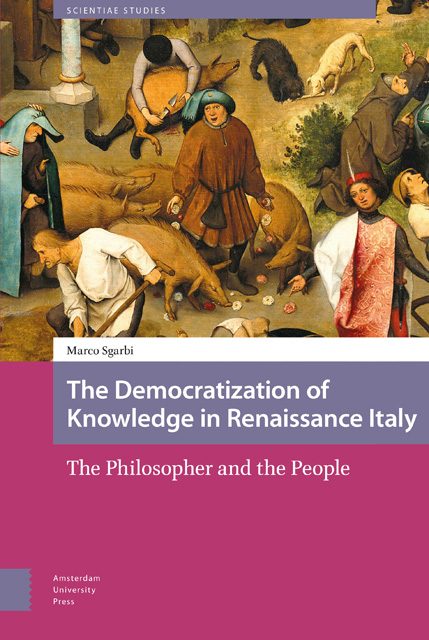7 - Epilogue
Published online by Cambridge University Press: 15 June 2023
Summary
Abstract
The conclusion deals with the potentialities and limits of the democratization of knowledge in relation to the process of the vulgarization of Aristotelian works. It shows how, after a first phase in which Aristotle was translated, paraphrased, commented upon, annotated, and summarized, there followed a second phase of popularization of his thought in almanacs, horoscopes, astrological discourses and physiognomic booklets, characterized by strong eclecticism and a mix of doctrines that make it impossible to consider these works within the bounds of the Aristotelian tradition.
Keywords: Vulgarization, Popularization, Eclecticism
I am seriously embarrassed in concluding this essay without a real conclusion. It is an open epilogue. My research leaves unresolved too many questions and too many problems for a single scholar to answer. In the previous chapters I have shown the possibilities and the limits of the democratization of knowledge. What I would like to point out at the end of this investigation are some consequences of this process, recapitulating what has been outlined above.
From the very beginning I have stressed the pivotal role of Erasmus. Starting from Erasmus is not a historiographical arbitrary choice. As we have seen, his work and spirit galvanise the thought of the vulgarizers and democratizers in a period in which to be associated with or related to Erasmus was extremely dangerous. Pier Paolo Vergerio recognizes the influence Erasmus had on generations of scholars:
Erasmus is the master of many scholars, and is like a great source for our times, many of these authors … are disciples and followers who have received knowledge from him.
To understand Erasmus’s contribution is essential for understanding how the process of the democratization of knowledge was sparked in sixteenth-century Italy. I do not want in any way to suggest that Erasmus was the initiator of this project, or to trace a direct genealogical line that sees in Erasmian thought the essential precondition without which some processes would not have happened. His thought, rather, represented a platform upon which intellectuals carried on the idea of the democratization of knowledge.
- Type
- Chapter
- Information
- The Democratization of Knowledge in Renaissance ItalyThe Philosopher and the People, pp. 197 - 208Publisher: Amsterdam University PressPrint publication year: 2022

